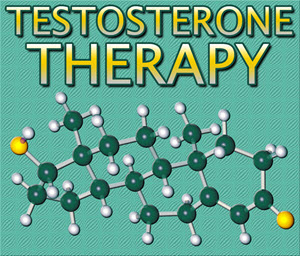Introduction to Testosterone Enanthate
Testosterone Enanthate is a widely used synthetic form of testosterone, a primary male sex hormone. Commonly prescribed for conditions such as hypogonadism, where the body does not produce enough testosterone, this hormone replacement therapy (HRT) has significant implications for reproductive health among American males. Understanding these effects is crucial for both patients and healthcare providers to make informed decisions about its use.
Mechanism of Action
Testosterone Enanthate works by supplementing the body's natural testosterone levels. Once injected, it is slowly released into the bloodstream, mimicking the natural production of testosterone by the testes. This can lead to an increase in muscle mass, bone density, and libido, but it also has the potential to disrupt the body's natural hormonal balance, particularly affecting the reproductive system.
Effects on Sperm Production
One of the most significant concerns with Testosterone Enanthate is its impact on spermatogenesis, the process of sperm production. High levels of exogenous testosterone can lead to a feedback mechanism that signals the brain to reduce the production of luteinizing hormone (LH) and follicle-stimulating hormone (FSH). These hormones are essential for stimulating the testes to produce testosterone and sperm. Consequently, prolonged use of Testosterone Enanthate can lead to a decrease in sperm count, potentially resulting in infertility.
Impact on Fertility
The potential for infertility is a critical consideration for American men considering Testosterone Enanthate therapy. Studies have shown that up to 90% of men on testosterone replacement therapy experience a significant reduction in sperm production. This effect is often reversible upon discontinuation of the therapy, but recovery can take several months to a year, and in some cases, fertility may not fully return to baseline levels.
Hormonal Imbalance and Sexual Health
Beyond fertility, Testosterone Enanthate can also affect other aspects of sexual health. While it may initially boost libido due to increased testosterone levels, long-term use can lead to a paradoxical decrease in sexual desire and function. This is often due to the suppression of natural testosterone production and the resultant hormonal imbalance. Additionally, some men may experience erectile dysfunction as a side effect of the therapy.
Monitoring and Management
Given the potential reproductive health risks associated with Testosterone Enanthate, regular monitoring is essential. Healthcare providers should conduct baseline assessments of sperm count and hormone levels before initiating therapy and continue to monitor these parameters throughout treatment. For men who wish to preserve their fertility, options such as human chorionic gonadotropin (hCG) therapy can be considered to help maintain sperm production.
Conclusion
Testosterone Enanthate is a valuable tool for managing conditions related to low testosterone levels, but its impact on reproductive health cannot be overlooked. American men considering this therapy should be fully informed of the potential risks to their fertility and sexual health. With careful monitoring and management, it is possible to mitigate these risks and ensure that the benefits of testosterone replacement therapy outweigh the potential drawbacks. As research continues to evolve, it is hoped that more refined approaches to hormone therapy will emerge, offering safer and more effective options for men's health.
Contact Us Today For A Free Consultation

- Testosterone Enanthate: Enhancing Athletic Performance and Associated Risks in the US [Last Updated On: February 18th, 2025] [Originally Added On: February 18th, 2025]
- Long-Term Health Risks of Testosterone Enanthate Use in American Men [Last Updated On: March 17th, 2025] [Originally Added On: March 17th, 2025]
- Testosterone Enanthate: Benefits, Risks, and Management for Low Testosterone Treatment [Last Updated On: March 18th, 2025] [Originally Added On: March 18th, 2025]
- Testosterone Enanthate's Impact on Sleep Quality in American Males: A Comprehensive Analysis [Last Updated On: March 19th, 2025] [Originally Added On: March 19th, 2025]
- Testosterone Enanthate: A Promising Treatment for Sexual Dysfunction in American Males [Last Updated On: March 19th, 2025] [Originally Added On: March 19th, 2025]
- Testosterone Enanthate: Dispelling Myths and Understanding Facts for American Men [Last Updated On: March 19th, 2025] [Originally Added On: March 19th, 2025]
- Testosterone Enanthate: Enhancing Muscle, Reducing Fat for Weight Management in American Men [Last Updated On: March 20th, 2025] [Originally Added On: March 20th, 2025]
- Testosterone Enanthate: A Promising Treatment for Depression in American Men [Last Updated On: March 20th, 2025] [Originally Added On: March 20th, 2025]
- Testosterone Enanthate: Enhancing Cognitive Function in Aging American Men [Last Updated On: March 20th, 2025] [Originally Added On: March 20th, 2025]
- Testosterone Enanthate: Benefits, Prostate Risks, and Monitoring for American Men [Last Updated On: March 20th, 2025] [Originally Added On: March 20th, 2025]
- Testosterone Enanthate: A Promising Therapy for Chronic Pain in American Males [Last Updated On: March 21st, 2025] [Originally Added On: March 21st, 2025]
- Testosterone Enanthate Cycle: Enhancing Performance and Managing Risks in Athletes [Last Updated On: March 21st, 2025] [Originally Added On: March 21st, 2025]
- Testosterone Enanthate: A Promising Treatment for Osteoporosis in American Men [Last Updated On: March 21st, 2025] [Originally Added On: March 21st, 2025]
- Testosterone Enanthate Therapy: Personalization, Monitoring, and Lifestyle Integration for American Men [Last Updated On: March 21st, 2025] [Originally Added On: March 21st, 2025]
- Testosterone Enanthate's Impact on Blood Sugar Levels in American Men: A Review [Last Updated On: March 22nd, 2025] [Originally Added On: March 22nd, 2025]
- Testosterone Enanthate Withdrawal: Symptoms and Management Strategies for American Males [Last Updated On: March 22nd, 2025] [Originally Added On: March 22nd, 2025]
- Testosterone Enanthate's Impact on Male Fertility: Insights for American Patients [Last Updated On: March 23rd, 2025] [Originally Added On: March 23rd, 2025]
- Testosterone Enanthate: A Promising Therapy for Obesity in American Males [Last Updated On: March 23rd, 2025] [Originally Added On: March 23rd, 2025]
- Ethical Dilemmas of Testosterone Enanthate Use Among American Males: A Comprehensive Analysis [Last Updated On: March 23rd, 2025] [Originally Added On: March 23rd, 2025]
- Testosterone Enanthate Therapy: Enhancing Veteran Health and Vitality [Last Updated On: March 23rd, 2025] [Originally Added On: March 23rd, 2025]
- Testosterone Enanthate: Effects on Hair Growth and Loss in American Men [Last Updated On: March 24th, 2025] [Originally Added On: March 24th, 2025]
- Testosterone Enanthate's Impact on Mental Clarity in American Males: Benefits and Risks [Last Updated On: March 24th, 2025] [Originally Added On: March 24th, 2025]
- Testosterone Enanthate's Impact on Appetite and Digestion in American Males [Last Updated On: March 24th, 2025] [Originally Added On: March 24th, 2025]
- Testosterone Enanthate: Enhancing Emotional Well-being in American Males [Last Updated On: March 24th, 2025] [Originally Added On: March 24th, 2025]
- Testosterone Enanthate: A Potential New Treatment for Allergies in American Males [Last Updated On: March 24th, 2025] [Originally Added On: March 24th, 2025]
- Testosterone Enanthate: Enhancing Injury Recovery in American Male Athletes [Last Updated On: March 24th, 2025] [Originally Added On: March 24th, 2025]
- Testosterone Enanthate: Impacts on Joint Health in American Men [Last Updated On: March 25th, 2025] [Originally Added On: March 25th, 2025]
- Testosterone Enanthate: A Promising Treatment for Anemia in Hypogonadal American Men [Last Updated On: March 25th, 2025] [Originally Added On: March 25th, 2025]
- Testosterone Enanthate: Enhancing Immune Function in American Men - Benefits and Risks [Last Updated On: March 25th, 2025] [Originally Added On: March 25th, 2025]
- Testosterone Enanthate's Impact on Cardiovascular Endurance in American Men: Benefits and Risks [Last Updated On: March 25th, 2025] [Originally Added On: March 25th, 2025]
- Testosterone Enanthate: Cultural Perceptions and Masculinity in American Society [Last Updated On: March 25th, 2025] [Originally Added On: March 25th, 2025]
- Testosterone Enanthate: Combating Age-Related Decline in American Men [Last Updated On: March 25th, 2025] [Originally Added On: March 25th, 2025]
- Testosterone Enanthate: A Promising Solution for Muscle Wasting in American Men [Last Updated On: March 25th, 2025] [Originally Added On: March 25th, 2025]
- Testosterone Enanthate Therapy: Benefits, Process, and Risks for Men Over 50 [Last Updated On: March 25th, 2025] [Originally Added On: March 25th, 2025]
- Testosterone Enanthate: A Promising Stress Management Tool for American Men [Last Updated On: March 26th, 2025] [Originally Added On: March 26th, 2025]
- Testosterone Enanthate Boosts Skin Elasticity in American Males: Benefits and Risks [Last Updated On: March 26th, 2025] [Originally Added On: March 26th, 2025]
- Testosterone Enanthate: A Potential Treatment for Chronic Fatigue Syndrome in American Males [Last Updated On: March 26th, 2025] [Originally Added On: March 26th, 2025]
- Testosterone Enanthate: Enhancing Endurance in American Male Athletes - Benefits and Risks [Last Updated On: March 26th, 2025] [Originally Added On: March 26th, 2025]
- Testosterone Enanthate Therapy: Benefits, Limitations, and Management for American Men [Last Updated On: March 26th, 2025] [Originally Added On: March 26th, 2025]
- Testosterone Enanthate: Enhancing Muscle, Reducing Fat, Boosting Performance in American Males [Last Updated On: March 26th, 2025] [Originally Added On: March 26th, 2025]
- Testosterone Enanthate's Impact on Dental Health in American Males: Risks and Recommendations [Last Updated On: March 27th, 2025] [Originally Added On: March 27th, 2025]
- Testosterone Enanthate's Impact on Vision and Eye Health in American Males [Last Updated On: March 27th, 2025] [Originally Added On: March 27th, 2025]
- Testosterone Enanthate: Benefits, Costs, and Risks for American Males [Last Updated On: March 27th, 2025] [Originally Added On: March 27th, 2025]
- Optimizing Testosterone Enanthate Therapy: Dosage, Monitoring, and Lifestyle for American Males [Last Updated On: March 27th, 2025] [Originally Added On: March 27th, 2025]
- Testosterone Enanthate Therapy: Impacts on Life Expectancy and Health in American Men [Last Updated On: March 28th, 2025] [Originally Added On: March 28th, 2025]
- Testosterone Enanthate: Enhancing Post-Surgical Recovery in American Men [Last Updated On: March 28th, 2025] [Originally Added On: March 28th, 2025]
- Testosterone Enanthate: Enhancing Respiratory Function in American Men [Last Updated On: March 29th, 2025] [Originally Added On: March 29th, 2025]
- Testosterone Enanthate: A Promising Treatment for Autoimmune Disorders in American Males [Last Updated On: March 29th, 2025] [Originally Added On: March 29th, 2025]
- Testosterone Enanthate's Role in Managing Diabetes in American Men: Benefits and Considerations [Last Updated On: March 30th, 2025] [Originally Added On: March 30th, 2025]
- Testosterone Enanthate Therapy: Kidney Function Impact in American Males [Last Updated On: March 30th, 2025] [Originally Added On: March 30th, 2025]
- Testosterone Enanthate's Impact on Hearing Health in American Men: A Comprehensive Review [Last Updated On: March 30th, 2025] [Originally Added On: March 30th, 2025]
- Testosterone Enanthate's Impact on Liver Health in American Men: Risks and Monitoring [Last Updated On: April 1st, 2025] [Originally Added On: April 1st, 2025]
- Testosterone Enanthate: A Promising Therapy for Hypertension in American Males [Last Updated On: April 1st, 2025] [Originally Added On: April 1st, 2025]
- Testosterone Enanthate: A Potential Treatment for Gastrointestinal Disorders in American Males [Last Updated On: April 3rd, 2025] [Originally Added On: April 3rd, 2025]
- Testosterone Enanthate: Enhancing Neurological Health in American Men [Last Updated On: April 4th, 2025] [Originally Added On: April 4th, 2025]
- Testosterone Enanthate's Impact on Adrenal Health in American Males: A Comprehensive Analysis [Last Updated On: April 6th, 2025] [Originally Added On: April 6th, 2025]
- Testosterone Enanthate: Enhancing Muscle and Bone Health in American Men [Last Updated On: April 7th, 2025] [Originally Added On: April 7th, 2025]
- Testosterone Enanthate's Impact on Thyroid Function in American Men: A Comprehensive Analysis [Last Updated On: April 8th, 2025] [Originally Added On: April 8th, 2025]
- Testosterone Enanthate: Benefits, Risks, and Endocrine Impact in American Men [Last Updated On: April 9th, 2025] [Originally Added On: April 9th, 2025]
- Testosterone Enanthate's Impact on Immune Function in American Males: A Comprehensive Review [Last Updated On: April 9th, 2025] [Originally Added On: April 9th, 2025]
- Testosterone Enanthate: A Promising Therapy for Respiratory Disorders in American Men [Last Updated On: April 10th, 2025] [Originally Added On: April 10th, 2025]
- Testosterone Enanthate's Impact on Gastrointestinal Health in American Males [Last Updated On: April 11th, 2025] [Originally Added On: April 11th, 2025]
- Testosterone Enanthate's Impact on Cardiovascular Health in American Males: Risks and Benefits [Last Updated On: April 11th, 2025] [Originally Added On: April 11th, 2025]
- Testosterone Enanthate's Emerging Role in Dermatology for American Men: A Comprehensive Review [Last Updated On: April 12th, 2025] [Originally Added On: April 12th, 2025]
- Testosterone Enanthate Boosts Hematological Health in American Men: Benefits and Monitoring [Last Updated On: April 13th, 2025] [Originally Added On: April 13th, 2025]
- Testosterone Enanthate: A Promising Therapy for Metabolic Disorders in American Males [Last Updated On: April 13th, 2025] [Originally Added On: April 13th, 2025]
- Testosterone Enanthate: A Promising Therapy for Neurological Disorders in American Males [Last Updated On: April 14th, 2025] [Originally Added On: April 14th, 2025]
Word Count: 506





















